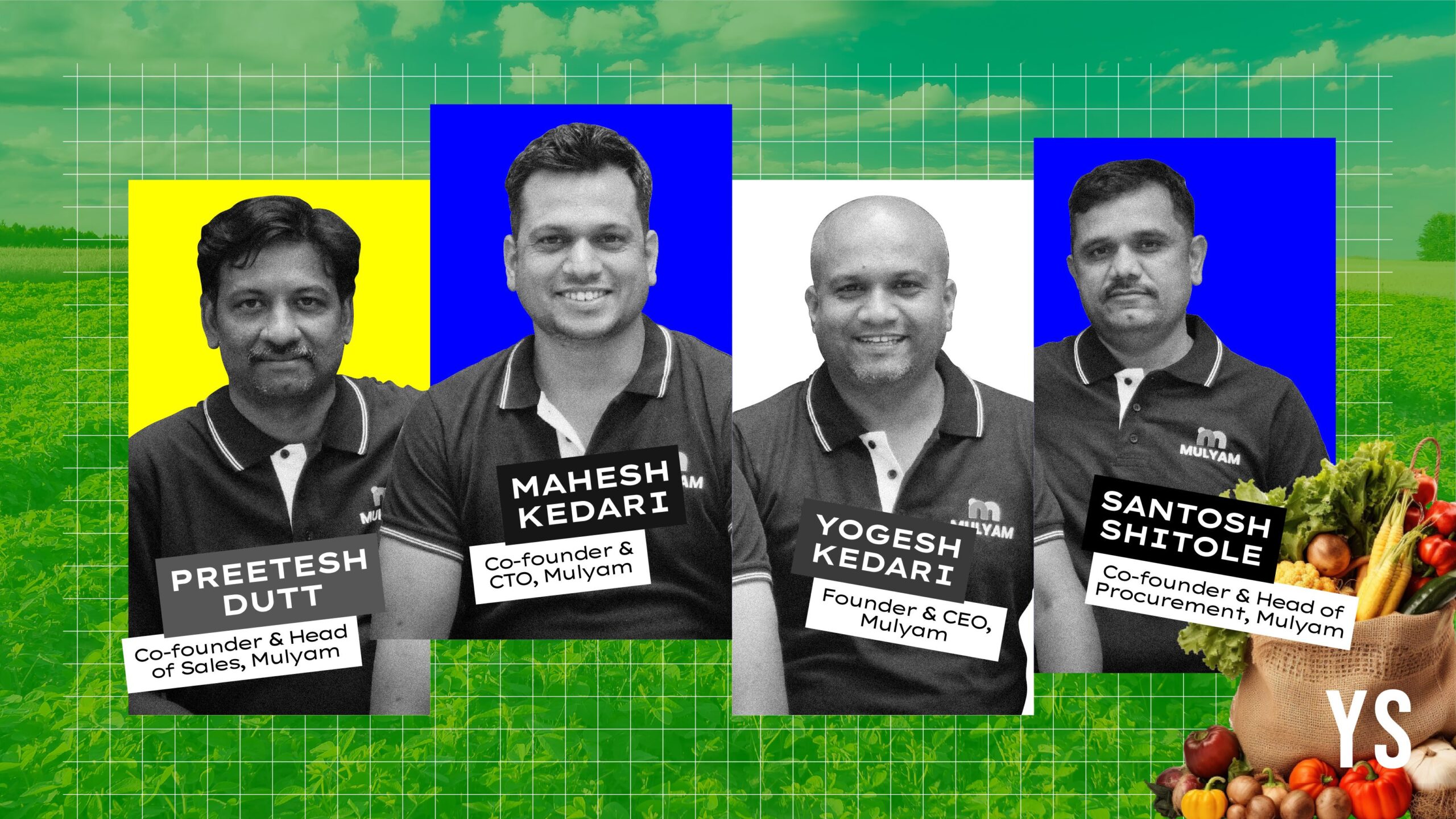Mahesh and Yogesh Kedari, coming from an agricultural family, were deeply aware of the challenges faced by farmers, particularly in selling their produce. They witnessed how inefficient supply chains led to losses, with up to 30-35% of fruits and vegetables rotting before they could reach consumers. This motivated them to come up with a solution to address these issues.
In December 2022, the brothers co-founded Mulyam, alongside Preetesh Dutt and Santosh Shitole, to improve the supply chain inefficiencies. The Pune-based startup is currently bridging the market accessibility gap for farmers. It helps farmers and Farmer Producer Organisations (FPOs) access distant markets and help them achieve better price realisations.
Yogesh is an MBA in Agriculture Business Management with 19 years of experience in agri-supply chains, and Mahesh is an electronics and telecom engineer. Preetesh and Santosh, former colleagues of Yogesh at Dehaat, joined Mulyam team with a shared vision of revolutionising the agricultural sector.
Yogesh says that aggregation is a challenge as most farmers have small farmlands. So, Mulyam identified lead farmers or FPOs who act as aggregators to achieve marketable quantities.
“During my corporate career, I saw that farmers selling produce without any market information was a recurring issue. While dry agri produce has a better shelf life and more stable markets, fresh produce faces fluctuating prices and shorter shelf lives. The agricultural community often depends on wholesalers and aggregators to liquidate their produce,” Yogesh tells YourStory.
Bridging the market accessibility gap
Mulyam focuses on aggregating produce of all grades from farmer aggregators or FPO networks. The company sells the produce directly to institutional buyers or through wholesalers in distant markets where FPOs and farmers may not have ventured to do business. This not only enhances market access for farmers but also helps them secure better prices for their produce.
According to Yogesh, Mulyam’s strategy eliminates at least three middlemen in the traditional agri value chain. By cutting out these intermediaries, the company is able to create a more streamlined and cost-effective process, ultimately allowing farmers to earn a fairer price for their produce.
In addition to this, the startup has introduced AI-powered quality and produce-handling systems to ensure farmers receive the best possible prices for their produce. The AI technology also helps in determining the precise quality and grade of the produce, allowing Mulyam to match the exact needs of customers.
“We aim to add value to every aspect of the agri supply chain, including logistics, sorting and grading services, and finance. This will benefit all stakeholders in the ecosystem. Our AI-enabled decision support system will help both farmers and buyers make informed business decisions. By providing market insights and data-driven analysis, we aim to increase profitability and reduce uncertainties,” states Yogesh.
Mulyam is also developing a B2B marketplace for select commodities, enabling the sale of fresh produce in bulk to smaller markets, primarily in Tier II and Tier III cities.
So far, it has managed to sell 600 metric tonnes of citrus fruits, 4,000 metric tonnes of potatoes, and 18,000 metric tonnes of onions.
Streamlining farmer and customer onboarding
Mulyam, with a team of 44 members, is currently working with over 3,000 farmers across India and is targeting 10,000 farmers across eight states. To ensure smooth onboarding, its sourcing manager personally meets farmers, verifying documents and market repo along with what kind of work they do before onboarding them as suppliers. Once the produce is checked for quantity and quality at Mulyam’s collection centers, it is graded, packed, and distributed to buyers across 17 cities.
For customer acquisition, Mulyam has a dedicated business development team for each vertical (MT – Modern Trade & HoReCa, wholesale buyers, and institutional buyers). Before onboarding them, the team conducts thorough background checks and market surveys to be sure that any supplier onboarded is authentic. Once the onboarding is complete, a dedicated account manager is assigned to each buyer, ensuring quality, consistency, and timely delivery.
“Our team also supports quick commerce by managing sourcing, sorting, packaging, and store deliveries across cities,” says Yogesh
Business model and revenue
Mulyam procures fruits and vegetables directly from farmers and then supplies them across India. While the startup keeps its margins low on the procurement side, i.e., the farmers, it generates profits by adding a margin when selling to buyers.
The government’s push to establish FPOs has played a crucial role in providing Mulyam with a solid foundation for its operations. While Many FPOs have been created to empower farmers, they lack market linkages. This is where Mulyam steps in, bridging the gap by offering essential services like aggregation, sorting, and grading.
“Our approach involves targeting a diverse range of customers through strategic partnerships and on-ground presence in key agricultural regions. By focusing on personalised solutions and superior customer service, we aim to establish a strong market presence and satisfy all stakeholders,” states Yogesh.
Since its inception, Mulyam has achieved a revenue of Rs 120 crore with positive EBITDA. The company recorded a GMV of Rs 35 crore in FY23 and is projected to exceed Rs 125 crore in FY25.
“We have not raised any funds and initial investments was made by friends, family and saving of Rs 10 lakhs,” says Yogesh.
Plans ahead
According to TechSci Research India, the Agricultural Commodities Market was valued at $9.07 million in 2024 and is anticipated to project steady growth in the forecast period with a CAGR of 5.15% through 2030.
Mulyam currently competes with players like VeGrow, Bijak, WayCool, and others. In the institutional supply market, the startup faces competition from many small suppliers who operate at lower costs.
“We believe that the market is vast enough that even 10 such players will not pose direct competition to us. Each competitor has its own strengths, geographical presence, and trade expertise,” says Yogesh.
“Our scale of operations gives us a competitive edge. By handling both wholesale and institutional business, we reduce operational costs and procurement prices compared to players who buy only specific grades from farmers at higher prices,” the founder explains.
Currently operating in Maharashtra, Uttar Pradesh, Delhi NCR, Haryana, Telangana, Tamil Nadu, Karnataka, West Bengal, Rajasthan, and Himachal Pradesh, Mulyam plans to expand its operations to other states and Tier II cities in existing regions.
The startup is also building a marketplace that includes multiple services such as logistics, trade financing, and quality assessment. It has completed its buyer’s app module, which is now live on the Play Store, and is working on the seller’s module.
Mulyam is also seeking to raise $10 million to expand its platform and build 40 collection centers, adding to its existing six centers in Maharashtra and Karnataka.
“Our goal is to achieve profitability with our current business model while reinvesting in platform development. Technology and strategic partnerships will drive our vision of transforming the agri-supply chain ecosystem,” concludes Yogesh.








![Read more about the article [Startup Bharat] What helped Juicy Chemistry grow revenue 44% despite competition in the skin and hair care space](https://blog.digitalsevaa.com/wp-content/uploads/2022/04/JCInfographic-01-1649769323538-300x150.png)

